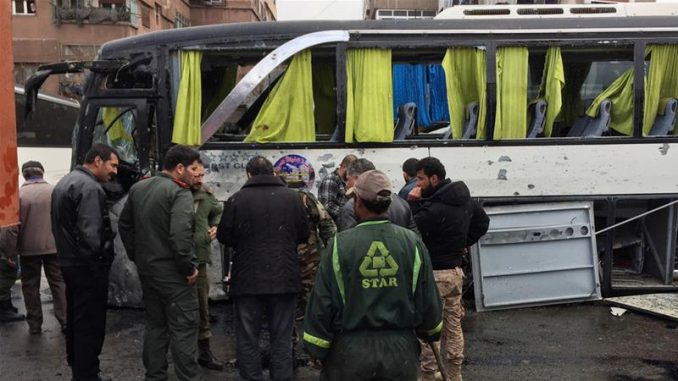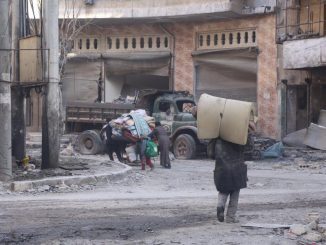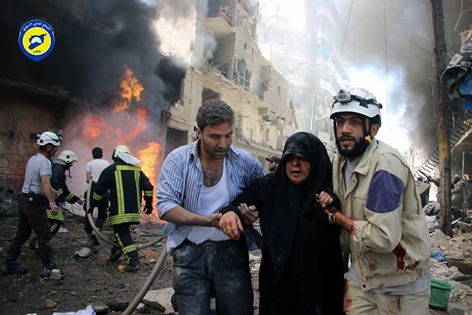
An alliance of militias in Syria known as Tahrir al-Sham has claimed responsibility for twin bombings attacking Shia pilgrims in the center of Damascus that killed at least 40 people.
The group, a large portion of which previously fought as an al-Qaeda affiliate, said the attack targeted “Iranian militias” and pro-government fighters in revenge for what it said was Iran’s role in supporting President Bashar al-Assad’s “tyrannical rule”, holding them responsible for “killing and displacing” Syrians.
“On Saturday … a twin attack was carried out by two heroes of Islam … in the center of the capital Damascus, killing and wounding dozens,” the statement said.
Tahrir al-Sham was created from a merger of Jabhat Fateh al-Sham – formerly al Qaeda’s Nusra Front – and several other groups.
In January, the Tahrir al-Sham alliance also claimed responsibility for twin suicide bombings in the high-security Kafr Sousa district of Damascus that killed 10 people, eight of them soldiers.
Dozens killed
The blasts occurred near the Bab al-Saghir cemetery in the Old City. The Syrian authorities classified the explosions as a terrorist attack, according to SANA news agency. Iran’s Press TV said the death toll has climbed to 40. Over 100 people were wounded.
No claim of responsibility was immediately made for Saturday’s attack.
Syria State TV aired footage from the scene showing blood-soaked streets and several damaged buses in a car park, apparently where the explosions went off near Bab al-Saghir cemetery. The cemetery is one of the capital’s most ancient and is where several prominent religious figures are buried.
A Syrian security source told Sputnik most of the wounded persons had been hospitalized and were undergoing treatment. Some messages suggested the blasts targeted a number of Shia pilgrims from Iraq.
“Preliminary statistics indicate the fall of around 40 Iraqi martyrs and 120 wounded,” Iraqi foreign ministry spokesman Ahmed Jamal said in a statement, terming it a “criminal terrorist operation”.
The UK-based Syrian Observatory for Human Rights said 76 people, including 43 Iraqi pilgrims, were killed when a roadside bomb detonated as a bus made its way through the Bab al-Saghir area of Damascus’ famed Old City, and then a suicide bomber blew himself up.
The war monitor said 11 bystanders and eight children were killed in the blasts, as well as 20 members of pro-government security forces.
Interior Minister Mohammed al-Shaar visited the wounded in local hospitals.
Shaar said the attacks targeted civilians, including Arab visitors, who were frequenting the shrines in the area. He didn’t elaborate, but Iraqi Shias often visit shrines in Syria. Iranians and other Shia from Asia are often also among the pilgrims to the area.
Series of attacks against Shiite-claimed areas
The Bab al-Saghir is an important Shiite site as it is claimed to contain the remains of those killed in the “Battle of Karbala.”
A journalist said the attack was one of the deadliest in recent memory in the Syrian capital. However, it is not the first against Shiite holy places in the heart of the Sunni-majority city.
“We are talking about a very significant death toll … What is unique is that Damascus – which is President Bashar al-Assad’s stronghold, he has firm support there – has been relatively safe. Attacks like this are not common,” she said.
The Sayeda Zeinab mausoleum to the south of Damascus, Syria’s most visited Shia pilgrimage site, has been hit by several deadly bombings during the six-year crisis.
In June 2016, a twin attack near the shrine has killed at least 12 people, while the Islamic State (ISIS) group claimed responsibility for the attacks via an online post.
The Observatory, however, reported a higher toll of at least 20 people killed and 30 wounded.
A string of ISIS bombings near the shrine in February 2016 left 134 people dead, most of them civilians, according to the Observatory. And in January 2016, another attack claimed by ISIS killed 70 people.
These attacks come as a response to the Shiite presence in Syria, as Assad has been supported in the country’s war by Shia militias from countries including Iran, Iraq, Afghanistan, and Lebanon.
The Syrian crisis began as a peaceful demonstration against the injustice in Syria. Assad regime used to fire power and violence against the civilians and led to armed resistance. 450.000 Syrians lost their lives in the past five years according to UN estimates, and more than 12 million have lost their homes.



